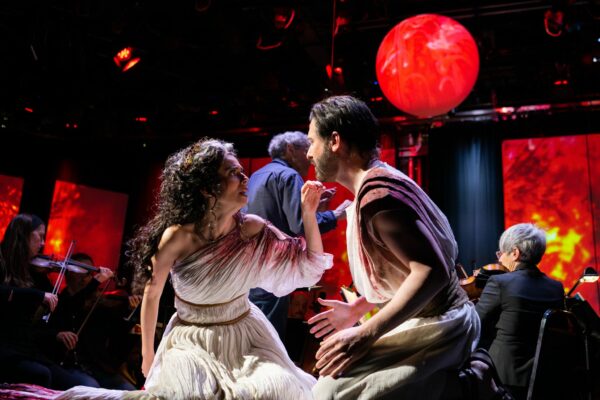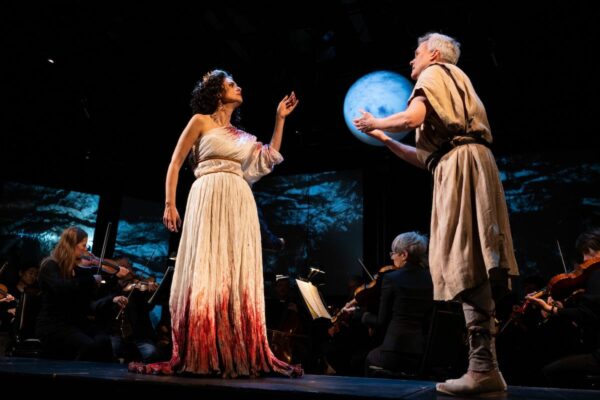Classical Concert Review: Boston Baroque’s “Iphigénie en Tauride”
By Aaron Keebaugh
Lithe and economical, Boston Baroque’s superb production of Iphigénie en Tauride proved the old adage that less can be more.
Iphigénie en Tauride, an opera in four acts. Libretto by Nicolas-François Guillard. Music by Christoph Willibald Gluck. Performed by Boston Baroque. Martin Pearlman, conductor. Mo Zhou, stage director. At GBH’s Calderwood Studio, Boston, April 23 at 3 p.m.

Soula Parassidis as Iphigénie and Jesse Blumberg as Oreste in a scene from Boston Baroque’s production of Iphigénie en Tauride. Photo: Sam Brewer
It begins like few other operas of its time: with strings and winds swirling like a gathering storm. Through it all, Iphigénie, priestess to Diana in Scythian Tauris, sings of a troubling dream in which she is forced to sacrifice her beloved brother Orestes to appease the tyrannical Thoas.
But the concentration of music and drama in Christoph Willibald Gluck’s Iphigénie en Tauride is as much a tale of friendship and family amidst the trials of imprisonment in a foreign land. Friday night at GBH’s Calderwood Studio in Brighton, conductor Martin Pearlman and Boston Baroque revealed that hope can emerge from even the gravest situation.
Though successful at its premiere in 1779, Gluck’s opera has fallen out of favor with most companies in recent decades. That’s difficult to understand: the gripping narrative is driven across a rich, varied, and delightful musical canvas.
Nicolas-François Guillard’s libretto fixates on the plight of Iphigénie, who had been sent to Tauris to become priestess to Diana at the end of Gluck’s earlier opera, Iphigénie en Aulide. But, while in service to the goddess, the luckless daughter of Agamemnon must perform blood sacrifices that drive her into ever greater despair. When two Greek refugees crash upon Scythian shores, Iphigénie is forced to kill one of them to appease her ruthless boss.
But, unbeknownst to Iphigénie, the captured couple are her brother Orestes and his close friend Pylades. Orestes is haunted by his decision to murder his mother, Clytemnestra, who had in turn slayed Agamemnon. He offers himself to the sacrificial altar in place of Pylades. But when brother and sister finally recognize the other — just as the knife is about to slit his throat — they overpower and kill Thoas. In a final twist, Diana appears to demand that the Scythians return her statues to Greece as potential tragedy fades into triumph.
Boston Baroque’s minimalist production allowed the stellar singing to convey every ounce of tension. As Iphigénie, Soula Parassidis, who stepped into the role last minute for an injured Wendy Bryn Harmer, palpably expressed the crushing anxieties of a woman who appeared to have lost everything. Salvation through death was a constant theme. Her dark mezzo-soprano was complimented by subtle vocal shakes that intensified the character’s death-obsessed intensity, summed up by Iphigénie’s yearning for release from earthly tribulation in “O toi qui prolongeas mes jours.”

Soula Parassidis as Iphigénie and William Burden as Pylade in a scene from Boston Baroque’s production of Iphigénie en Tauride. Photo: Sam Brewer
Jesse Blumberg also compelled as Orestes, his oaken baritone swelling with bitter remorse over leading Pylades to his death. Tenor William Burden, as the ever-faithful friend, warmly assured Orestes of his love and devotion in their duet, “Ah! Mon ami, j’implore ta pitié.”
As Thoas, David McFerrin was a menacing vocal presence. His singing in “De noirs pressentiments” boomed with frantic pleasure at the thought of appeasing the gods with human blood. In the brief role of Diana, Angela Yam sang with fitting rococo brilliance.
The Boston Baroque chorus sang vibrantly as Scythian guards and servants of Diana. Pearlman kept the orchestral accompaniment coursing urgently, mired only by few fitful attacks in the strings.
Mo Zhou’s staging made generous use of the traditional park-and-bark style, with the singers situated all around the circular stage. Video images displayed on rear panels emphasized the dramatic action with an eye on underlining the work’s potent emotional symbolism — red for murder, silhouettes for memories, and churning seas for the opening storm. Lithe and economical, this superb production proved the old adage that less can be more.
Aaron Keebaugh has been a classical music critic in Boston since 2012. His work has been featured in the Musical Times, Corymbus, Boston Classical Review, Early Music America, and BBC Radio 3. A musicologist, he teaches at North Shore Community College in both Danvers and Lynn.
Tagged: Boston Baroque, Christoph Willibald Gluck, Iphigénie en Tauride, Laurence Senelick
